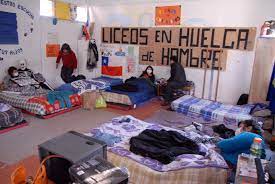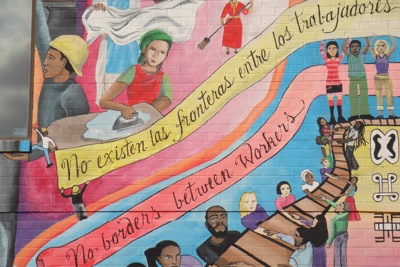
Women occupy Yare Prison in Venezuela
In Nigeria this week, in response to fuel prices and, even more, to astronomical unemployment and crushing hopelessness among young people, protests, and more, have punctuated the landscape. Occupy Nigeria. Labor unions, women’s groups, farmers’ groups and others have joined, and to a certain extent followed, the lead of their younger comrades. In Kano, for example, the youth have established what they call “Tahrir Square”. Elsewhere, some say that an “Arab Spring” is coming to Sudan, to Zimbabwe, to a theater of engagement near you.
In Haiti, as in Chile as in the United Kingdom as in Spain, students are protesting the inequality of education and the crushing hopelessness it produces. As various forces attempt to privatize a university opening in Limonade, the students of the University of Haiti, l’Université d’Etat d’Haïti, have declared themselves indignés. Indignados.
We are all, or almost all, moving towards our own Tahrir Square; we are all, or almost all, indignés, indignados. Language, concepts, actions not only exceed the borders they cross, they redefine notions of nationhood, identity. Or such is the dream and hope. Indignados articulate with Zapatistas articulate with Arab Spring and Tahrir Square articulate with indigenous movements and keep sending out new feelers, new shoots, new threads that somehow link new and old into something possible, something happening right now.
And so in northern Venezuela this week, 800 women and 150 children occupied the Yare prison complex. They came to visit their loved ones, who suffer overcrowding and overly long waits for trials, as so many do in so many prisons around the world. Then, they simply refused to leave. They `self-kidnapped.’ They invaded and occupied the prison space with their indignation.
950 women and children looked at armed guards and said, “Nope, we’re not moving.” They invented Spring, the beginning of a kind of liberation.
You want to know what this Spring could mean? Ask the many immigrant women in US immigrant detention centers, women like Julie, who are told they have no right to legal representation, no right to due process, because, well, they’re not in `prison’. They’re in `detention.’ And so they sit, watched, and often sexually harassed and worse, by guards. Most of the detention centers are privately owned. Profit flows from the time women, mostly women of color, sit and wait.
Many of the women live with mental health illnesses. Actually, many are in crisis. Many of the women struggle with the consequences and scars of domestic violence. Many of the women know they are in `detention’ because their English `failed’ them, and because, though they lived in neighborhoods in which English was a second language, somehow the police only spoke English. Who’s failing whom here?
This week, the young women and men of Nigeria have urged us to occupy and liberate public policy. The young women and men of Haiti have urged us to occupy and liberate education. And the young women and children of Venezuela have called on us to occupy prison.
Occupy prison. We have been occupied by the global prison for far too long. Follow the lead of the women and children of Venezuela. Occupy prison. It’s time.


